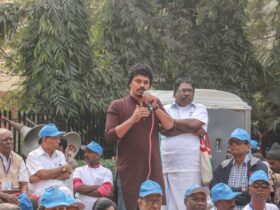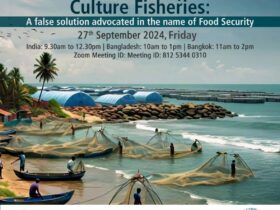Statement made by: World Forum of Fisher Peoples (WFFP) and International Collective in Support of Fishworker (ICSF) on
Made at: Eleventh Conference of Parties to the CBD, 8-19 October 2012.
Agenda Item 13.3: Inland Waters Biodiversity
With millions of people dependent on inland water fisheries for a livelihood, fishing communities perhaps have one of the largest stakes stake in ensuring the health of inland waters and their biodiversity. It is important to ensure the participation of indigenous peoples and local communities, including fishing communities, in the conservation and sustainable use of inland waters biodiversity if long-term conservation goals are to be met and if the ability of biodiversity to continue to support the water cycle is to be maintained. This would require the integration of the traditional knowledge, practices and rights of the Indigenous Peoples and local communities.
Supporting Indigenous Peoples and local communities, particularly fishing communities, to sustainably manage inland waters, by strengthening cooperation on capacity building and governance, promoting secure land and water tenure, and particularly by putting in place participatory decision-making processes and benefit sharing arrangements, is crucial to the conservation of inland water biodiversity and maintenance of the water cycle.
We ask Parties to:
- Recognize the traditional knowledge and practices of Indigenous Peoples and local communities, including fishing communities, on conservation and sustainable use of inland water biodiversity and ensure they are integrated into the implementation of the programme of work.
- Recognize the traditional rights of Indigenous Peoples and local communities to inland waters and their biodiversity and ensure that they are, established, protected and promoted at all levels, especially in light of the indepth review on the Inland waters biodiversity programme of work to reinforce conservation efforts by expanding the protected area network in inland waters.
- Ensure water and livelihood security of Indigenous Peoples and local communities, including fishing communities dependent for livelihoods on inland waters, before water is diverted for other uses such as agriculture and industry.
- Assess the potential impact of development projects such as dams on the water cycle and on inland waters biodiversity as well as on Indigenous Peoples and local communities through rigorous EIA and SEA processes.



Leave a Reply